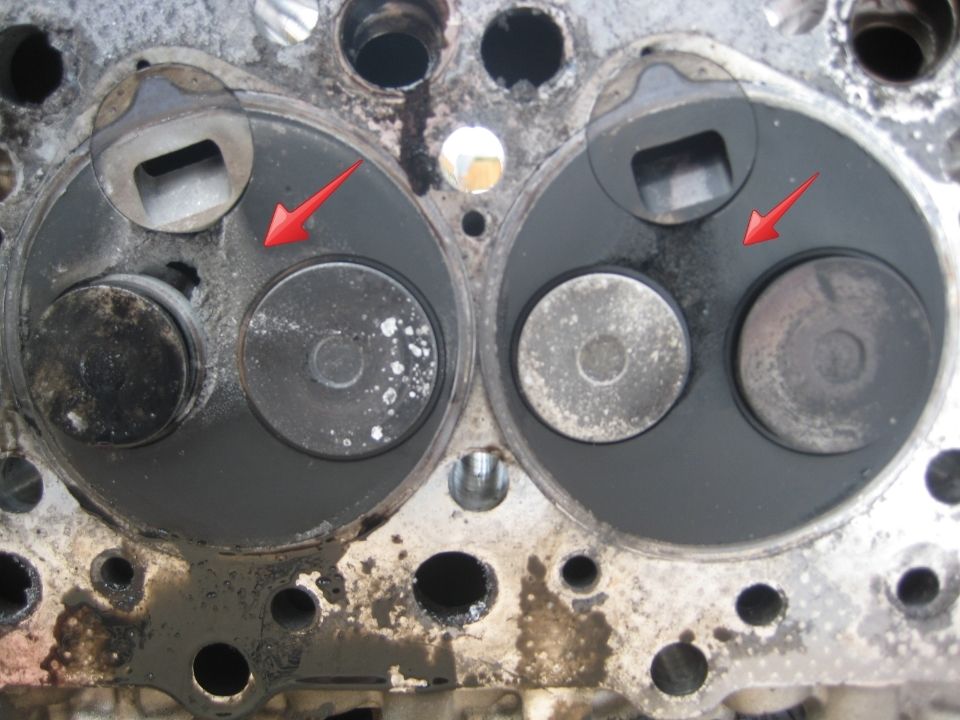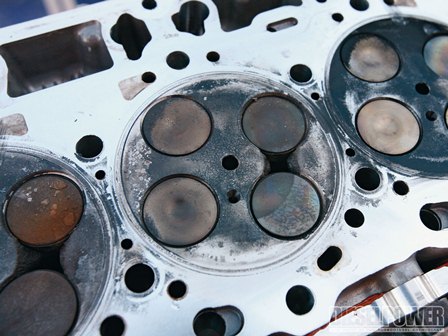Page 1 of 2
Lost engine compression
Posted: Sat Feb 22, 2014 4:15 pm
by DylanQ
Hi guys. So I recently replaced the cylinder head, gasket, water pump, oil seals, etc on my L300. Everything was running A-OK. Recently my wife took a trip that was supposed to be from Salmon Arm to Vancouver, but she only made it to Merritt. She told me the van immediately shut off as she was climbing a hill. She told me the coolant was spraying out of the side of the motor all over the underside. The mechanic there that had a quick peek at it said there was no compression in the motor when he tried turning it over and it was most likely the head gasket. When I finally got the van towed back to Salmon Arm and a chance to look under the hood, the first thing I noticed was that the heater hose had burst close to the head. I have since replaced the hose and there is still no compression in the engine at all. The starter spins fast and everything turns but no compression. Any ideas?
Thanks
Dylan
Re: Lost engine compression
Posted: Sun Feb 23, 2014 10:18 am
by philmeup1
Hey Dylan,,
I'm probably one of the more "mechanically declined" on this site. But did you replace the timing belt?? I know that's a critical thing on these motors.....
I really hope it's nothing serious.
Good luck, Phil
Re: Lost engine compression
Posted: Sun Feb 23, 2014 10:50 am
by DylanQ
Yes all belts were replaced. I'm going to strip it down again and investigate. I'm really hoping it's just a gasket issue, but there is a chance the head cracked

Re: Lost engine compression
Posted: Sun Feb 23, 2014 12:47 pm
by thedjjack
what quality headgasket was used? seems like no name jobber ones do not last.
Compression down the coolant passages would be enough to blow the hose up.... Headgasket, cracked head, or timing belt failure (tensioner, balance belt taking out timing belt).
I would pull the cover of the belts check
I would then pull the glow plugs and do a leak down test (you could make one yourself)
I hope it is just the head gasket...
Got a EGT gauge on that thing.... that is a big climb (I always pull off in Merritt and take the cold water road adds 5 minutes removes a huge climb). Make sure coolant system OK and injectors/timing good, boost good etc....
Gasket going could be result of an other issue....
Re: Lost engine compression
Posted: Thu Feb 27, 2014 12:35 pm
by DylanQ
So I pulled the head off today. And found this. Can anyone tell me why this would be happening? Cylinder 2 on the left. 3 on the right.

Re: Lost engine compression
Posted: Thu Feb 27, 2014 7:41 pm
by Big-Bird
Looks like a crack formed between the intake valve and the precup (the rectangular hole) and the air/fuel mixture eroded the area during combustion.
The air pressure gets really high as does the air temp during compression so when the fuel was introduced it made the cracks progressively worse.
I bet if you look inside the intake ports you will see carbon deposits on #2 and #3 ports.
That head might be repairable but an engine shop can advise.
Re: Lost engine compression
Posted: Fri Feb 28, 2014 3:10 am
by Growlerbearnz
That's the most horrifyingly damaged head I've ever seen. It's scrap.
Has someone by any chance turned up the fuelling? Do you get thick clouds of black, sooty smoke at full throttle? And did someone drive up a long hill with their foot to the floor even though it didn't make the van go any faster? And kept going even when it started to shake and misfire and the coolant gauge went off the scale? Because that would do it.
I'm going to have nightmares now, thanks so much.
Re: Lost engine compression
Posted: Fri Feb 28, 2014 8:13 am
by Big-Bird
The Duramax Forum has a few pics of this kind of failure on their V8's.
Here's a sample pic of a 4 valve head. They tech stated the aluminum gets hot and starts to melt a small area....as the ignition cycles pound away ( even at idle 800 RPM or as high as 2400 RPM cruising) it wouldn't take long for catastropihc failure to occur.

- Melted Durmax head.jpg (43.84 KiB) Viewed 8314 times
Cracks are a likely source for this heated area to get a toe hold...but it could certainly be made worse by a poor cooling system +/or excessive injection of fuel. My money is that the head on your 2.5L had cracks in critical areas that got progressively worse. Most of these guys do not recommend repairing a head that experienced excessive heat that caused melting to occur.
I do wonder if your turbo has been affected by the metal spray that would have been pushed through the exhaust valve/port. Hot metal spray can attach itself to the turbo fins and cause out of balance conditions.
Re: Lost engine compression
Posted: Fri Feb 28, 2014 11:06 am
by DylanQ
Thanks for the info Big-Bird. Now the part that baffles me is that this head is only 45 days old. So it this leads me to believe that either it cracked the very first time I fired it up, the gasket failed, or it was defective in the first place. I can't see how that much damage could have happened so quickly.
Re: Lost engine compression
Posted: Fri Feb 28, 2014 4:07 pm
by jelbon
Could burning gasoline cause that?
How long after refueling did it burn out?
Re: Lost engine compression
Posted: Fri Feb 28, 2014 5:00 pm
by Big-Bird
jelbon wrote:Could burning gasoline cause that?
How long after refueling did it burn out?
Yikes, now thats a scary scenario......gas diesel mix in a diesel engine.....I wonder if the head bolts would have been able to hold the pressure from that ignition cycle!
Re: Lost engine compression
Posted: Fri Feb 28, 2014 5:20 pm
by Big-Bird
DylanQ wrote:Thanks for the info Big-Bird. Now the part that baffles me is that this head is only 45 days old. So it this leads me to believe that either it cracked the very first time I fired it up, the gasket failed, or it was defective in the first place. I can't see how that much damage could have happened so quickly.
Was the head gasket torn or burned? The gasket remains/bits tell me that it was not the problem.
If the coolant system started to leak first and the fluid in the head fell below a certain limit where combustion chamber heat could not be carried away...by the coolant that is normally in the head....its possible cracks developed and the heat kept building to a point that the aluminum started to melt. A run away condition ensues....coolant drops, heat climbs followed by catastrophic head failure.
When the engine quit it was because it could not build compression due to the gaping melted holes in the head which probably formed within minutes of the coolant loss.
Aluminum melts around 660 degrees C.
Diesel fuel will auto ignite at around 250 C.
2000rpm on a normal drive divided by 4 cylinders means that a single cylinder is ignited 500x a minute.
Look at your EGT temps.....I know mine hit well over 600 on a an easy drive and close to a 1000 on a hill under load.....The heat soak capability of the head reaches a critical point and....well....just melts when the coolant isn't there to do its job.
Re: Lost engine compression
Posted: Fri Feb 28, 2014 8:25 pm
by DylanQ
Big-Bird wrote:DylanQ wrote:Thanks for the info Big-Bird. Now the part that baffles me is that this head is only 45 days old. So it this leads me to believe that either it cracked the very first time I fired it up, the gasket failed, or it was defective in the first place. I can't see how that much damage could have happened so quickly.
Was the head gasket torn or burned? The gasket remains/bits tell me that it was not the problem.
If the coolant system started to leak first and the fluid in the head fell below a certain limit where combustion chamber heat could not be carried away...by the coolant that is normally in the head....its possible cracks developed and the heat kept building to a point that the aluminum started to melt. A run away condition ensues....coolant drops, heat climbs followed by catastrophic head failure.
When the engine quit it was because it could not build compression due to the gaping melted holes in the head which probably formed within minutes of the coolant loss.
Aluminum melts around 660 degrees C.
Diesel fuel will auto ignite at around 250 C.
2000rpm on a normal drive divided by 4 cylinders means that a single cylinder is ignited 500x a minute.
Look at your EGT temps.....I know mine hit well over 600 on a an easy drive and close to a 1000 on a hill under load.....The heat soak capability of the head reaches a critical point and....well....just melts when the coolant isn't there to do its job.
Ok, thank you for the explanation. So this brings me back to the heater hose bursting. With what you have just told me that would be the likely culprit. It was old and weathered and it's my mistake for not changing it. It burst, all of the coolant was lost, and it overheated within minutes. Does this sound accurate? As I said I wasn't there so I myself am trying to figure out what happened here so that it does not happen again with a new head. As for the gasket, I definitely do not consider myself an expert by any means, but it seems to be ok.
Big-Bird wrote:jelbon wrote:Could burning gasoline cause that?
How long after refueling did it burn out?
Yikes, now thats a scary scenario......gas diesel mix in a diesel engine.....I wonder if the head bolts would have been able to hold the pressure from that ignition cycle!
I have been told and reassured that gasoline was never put into the engine.
Re: Lost engine compression
Posted: Sat Mar 01, 2014 12:32 am
by Big-Bird
Yes, by jove I think you got it!
Lost engine compression
Posted: Sat Mar 01, 2014 8:58 am
by Firesong
Lack of coolant also doesn't create a warning bell. Ie. No coolant doesn't show as overheating on a gauge. Some of the gauges out there warn if coolant levels drop.
